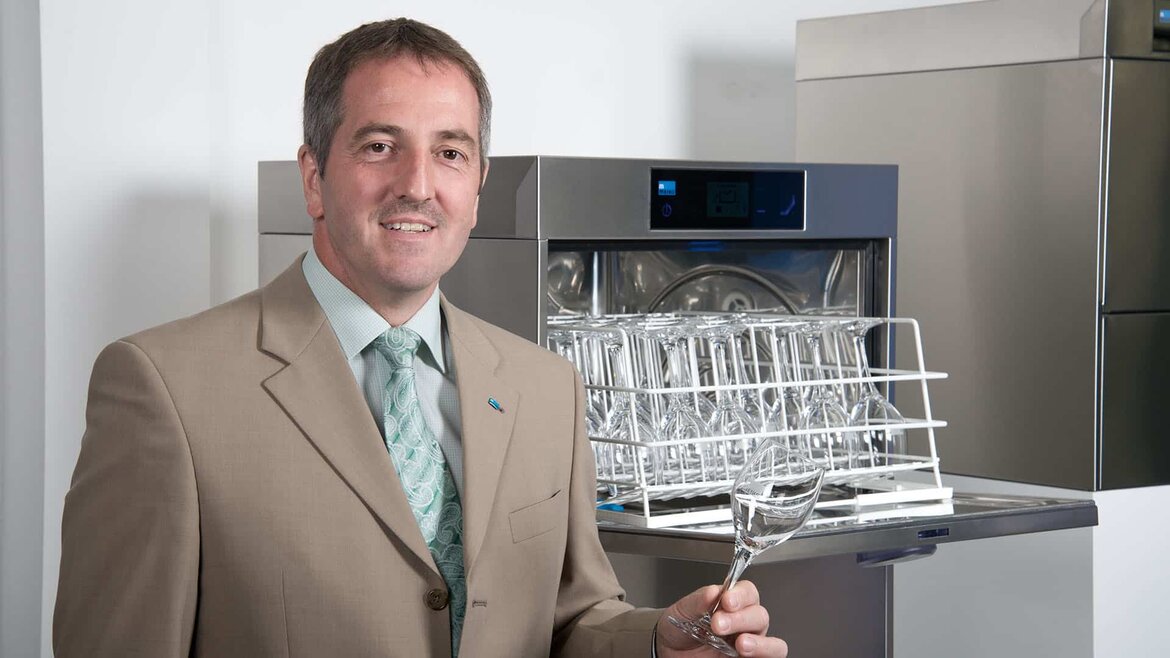AVOIDING GLASS DAMAGE
More than just good intentions are needed to achieve sparkling results!

Frank SchwarzIn catering, high profit margins are gained through the sale of beverages. And anyone who offers drinks in the right glass, practically justifies their price strategy automatically, at the same time ensuring that their customers feel good. This makes glasses an important part of the added value chain, disregarding the initial investment when buying them. They should and need to be managed. At the end of the day, happiness is as brittle as glass! We spoke to Frank Schwarz about the role of glass washing in adding value, about the causes and effects of glass damage, which goes far beyond simple breakage, and about the specialist knowledge of the glass-washing professional. A graduate engineer, he is the Head of Specialised Trade Germany for dishwasher manufacturer MEIKO in Offenburg and his opinions on glass management matters are crystal clear.
Question:
Mr Schwarz, why is it so difficult to wash glasses perfectly, let them dry and achieve a perfect shine, without having to get the polishing cloth out?
Frank Schwarz:
Because there is much more to glass management, which is in fact a process in the hotel and catering industry and apparent in the added value, than just the good intention to achieve sparkling results. There are many factors that are decisive in obtaining perfect wash results. Among them are the quality of the glass, the water quality, washing time, washing solvents and rinse temperature, detergents and rinse aids, and handling and operating methods are also of great importance.
Question:
The choice of glasses is in the caterer's hands, the technical details of the wash can be changed, but it's hardly possible to look for another water supply company...
Frank Schwarz:
Correct. But it is possible to play an active role when the water comes out of the tap by treating the water or by using a reverse osmosis system. Thanks to reverse osmosis, the GiO module, which MEIKO offer as an optional extra for their dishwashers, achieves the conditions that are necessary for optimum results where water quality is concerned.
Question:
Washing time, solvents and rinse temperatures, as well as the dosage of detergents and rinse aids are presumably not easy to set on a dishwasher either. Why is that? Are you happy to send your customer service staff out?
Frank Schwarz:
No, that has nothing to do with it. If we were to give the user a lot of leeway in terms of machine setting, conversely that would mean that we would also have to provide technical support for a lot of things. Here, Sinner's circle comes into play, which organises the mechanisms of action in cleaning cycles. It depicts four parameters: cleaning chemistry, mechanics, temperature and time, which all depend upon each other. They can be changed individually, but care must be taken to ensure that they are in exact proportion to each other. I cannot imagine that the users of our machines wish to enter so deeply into how they work. Unfortunately we are unable to override chemical and physical laws for our customers.
Question:
We still haven't discussed the subject of handling in glass management. It's not just a matter of dropping glasses as little as possible, is it?
Frank Schwarz:
Indeed, glass handling in the context of the washing process can contribute greatly to glass corrosion. In order to avoid damage, the glasses should not touch each other when loaded into the machine, so that they are not affected by the vibrations. As a manufacturer, we are in a position to programme our customers' machines in such a way that the glasses are washed at the beginning with just a little pressure. This makes the glasses readjust themselves in the tray so to speak. To do this, they need space. Then, when a curtain of water has formed over all of the glasses to be washed, everything runs perfectly.
In the case of delicate glasses, very high temperatures are to be avoided. When the machine has come to the end of its programme, it should be unloaded without delay, as the glass reacts with the residual moisture in the machine. It's really quite simple...
Question:
But don't lower temperatures imply forfeiting hygiene and safety?
Frank Schwarz:
Bacteria need food. They feed on any food or drink they can find on the objects to be washed. For this reason, any food scraps or leftover drink must be removed completely, because if we take away the bacteria's subsistence, we can vary the temperature. Where nothing can be found, nothing needs to be killed with heat.
Question:
We haven't got round to discussing chemistry yet...
Frank Schwarz:
Which is also a component of Sinner's circle and should ideally be regulated by a specialist. When iridescent areas build up on the glasses, there is probably too much rinse aid being used, which changes the refraction index of the glass. Not a pretty rainbow in any case.
Question:
As the youngest generation of machines in the undercounter machine product group, the M-iClean is particularly recommendable for glass washing - why is that?
Frank Schwarz:
The M-iClean has a specially developed man to machine interface. We hope that as a machine manufacturer we can make a contribution towards eliminating as many handling errors as possible and ensure sparkling results. With a neat solution!

